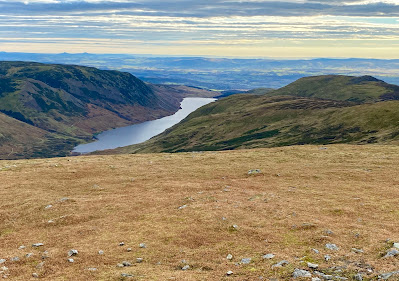2021 was the year when time was on our side as we drifted in and out of lockdown, restricted by travel bans and through the adoption of many other self-regulated constraints. Reading and gardening should have been the beneficiaries. The days of reading 20 or so books a year are challenged by reading all sorts of articles, news items and blogs online as well as curating masses of emails, many of which serve no useful purpose.
I have resisted Twitter, Instagram and given up on Facebook and that probably reduces the angst that they generate. I only buy a Sunday newspaper but spend an hour or so each day reading articles online. I have taken to reading Private Eye for the excellent MD pages that provide a Doctor's insiders perspective on how we have coped, or not coped, with Covid. Elsewhere in the Eye, the peal of revelations about the corrupt practices of MPs, companies and public agencies simply adds fuel to the imperative for a radical overhaul of the UK's constitution, if not the existence of the UK.
And so to books. For the first time since I started counting in 1988, I have not reached double figures. The fiction category provided nothing worth recommending, perhaps a result of finding it too difficult to select worthy novels from the avalanche of new publications or the dozens of older books that stare at me from groaning bookshelves.
Non-fiction was different, Gavin Esler, the BBC journalist provided an insightful book, How Britain Ends. It charts the growth of English Nationalism as the justification for a written constitution with the devolved nations and English regions taking responsibility for the majority of functions that Westminster struggles to manage. Whilst repetitive at times, it is a well-judged addition to the debate that should be far more prominent as we suffer the consequences of austerity, an ever-increasing control by the UK government, the damage of Brexit and the disastrous handling of the Covid pandemic. The primacy of London and the South East has been an abiding contagion for the other English Regions as well as the devolved nations.
I was mesmerised by James Rebanks book English Pastoral which reflects on his journey as an upland farmer in the Lake District. It is a humble story of coming to terms with what has gone wrong with modern farming and the need for regenerative agriculture. He references the experiences of three generations of his family as hill farmers. Whilst he is critical of modern methods of monoculture that have stripped out hedges, removed wetlands and made extensive use of chemicals, he is also dismissive of large scale rewilding. He describes the importance of soil management by rotating crops and the benefit of grazing by cattle and sheep. It is a nuanced argument that gains merit by his open admission to past mistakes driven by fertilizers and an obsession with economies of scale. It is also a plea for diversity in the way we manage land and by referencing Jane Jacobs, who in the 1960s had argued for the diversity of land uses in the city, he provides a powerful reminder of the need for systems thinking. The whole book was laced with descriptions of places and activities in the Lake District that I am familiar with and made the book doubly powerful.
Finally, I am well immersed in the book After the Virus by Hilary Cooper and Simon Szreter of Cambridge University. It is a powerful critique of the UK's response to the pandemic but set in a historical context. It argues that Britain has had two periods, the Elizabethan Poor Laws and the creation of the Welfare State after WWII when pandemics and food shortages have been overcome by collectivist measures. Conversely, the neoliberal policies of the past forty years have undermined the social fabric of the country and left the most vulnerable exposed to delayed and flawed decisions. The authors go as far as suggesting the principles that are necessary to restore a nurturing state. It is a book that could have been more tightly edited but through its historical perspective goes further than the excellent critiques of UK policy by the BMJ and Professor Devi Sridhar at the beginning of the year.
Needless to say, we are still awaiting the government's own inquiry of its performance during the pandemic. The evidence is already available from many trustworthy sources so why would we believe an inquiry from a government that routinely misrepresents facts and was led by such luminaries as Boris Johnson, Matt Hancock, Rishi Sunak, and Dido Harding. I suspect we will have a new PM long before the government inquiry ever sees the light of day.

























































